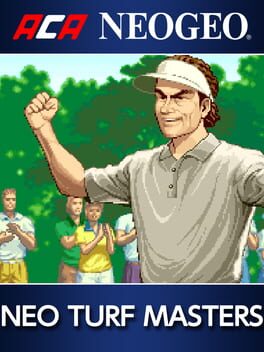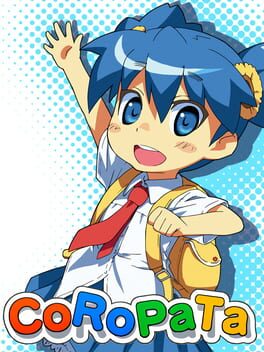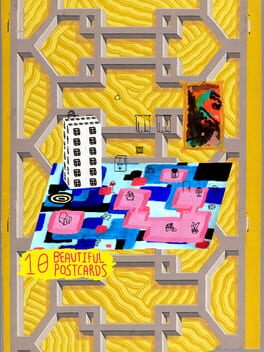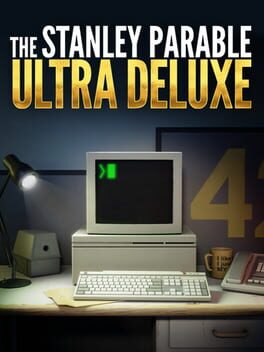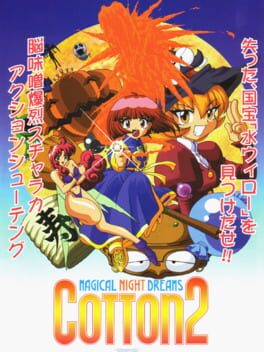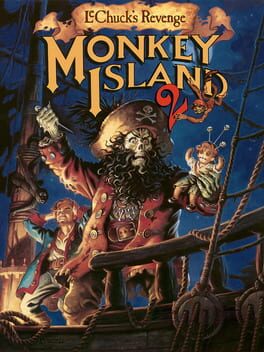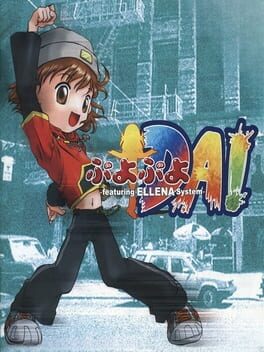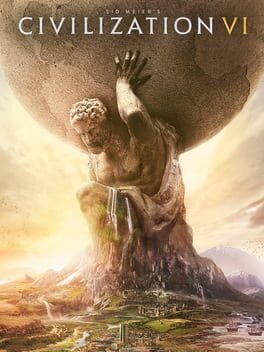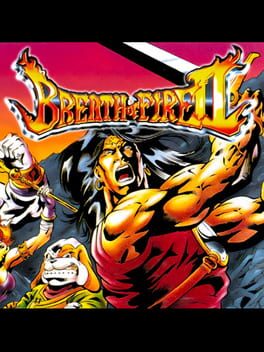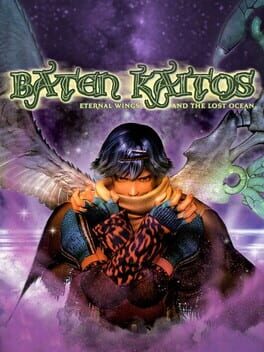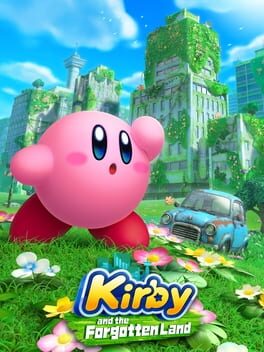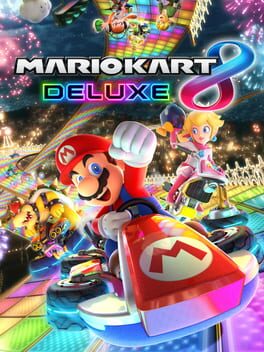BeachEpisode
This is my Stranger of Paradise.
Lovingly crafted kusoge, when DLSite crosses wires with Steam. In all honesty, this isn't too good as a Devil May Cry thing, it's more of a basic action roguelite with chronically little meat on its bones - but is still an endearingly earnest attempt to right Kadokowa's wrongs by acting as a rewrite of season 2. Kemono Friends was great, and one of the most speedy slaughters of a golden goose I've ever seen, the show's meteoric rise in popularity only to be decimated by a couple stuck up old fogeys at the executive level still wounds my sugoi heart to this day.
Lovingly crafted kusoge, when DLSite crosses wires with Steam. In all honesty, this isn't too good as a Devil May Cry thing, it's more of a basic action roguelite with chronically little meat on its bones - but is still an endearingly earnest attempt to right Kadokowa's wrongs by acting as a rewrite of season 2. Kemono Friends was great, and one of the most speedy slaughters of a golden goose I've ever seen, the show's meteoric rise in popularity only to be decimated by a couple stuck up old fogeys at the executive level still wounds my sugoi heart to this day.
2009
If you've spent any time in the early to mid 2010's browsing games forums, you've likely seen a handful of gifs from Coropata. It's certainly attention-grabbing - a cute and expressive airhead character, sweet pastel colour scheme, many sets of sprite animations to match all of the things that she can interact with and respond to. It's all very fluffy and endearing. It released as a Japan-only title on the DS but very recently recieved an English localisation on the PC, which was a nice surprise.
I've been chipping away at Coropata piecemeal over the past year or so during work lunch breaks on my phone, which is probably the ideal way to play the game really. It's a level-based physics puzzle game akin to something like Fantastic Contraption, but your task is more focused on completing a rube-goldberg machine with whatever few objects have been made available to you, all to assist Himawari on her errands. The rub here is that the difficulty curve is comically steep, and not necessarily for any sense of mastery of the game's own logic, your successes are forged through trial and error - repeatedly micro-adjusting objects a pixel to the side until the ball deems you worthy and reluctantly goes into the goal. It truly is just shoddy physics work here, and it makes proceedings so much more frustrating than they need to be. You could move a wooden plank on the complete opposite side of the board a smidge, and it'll make a seesaw it never even touches swing differently.
So, why did I stick with it through to the end? It doesn't seem like many people do. At the time of writing I wholeheartedly could not find a single guide for solutions, the Steam community screenshots don't even go any further than chapter 2... Like games similar to Fantastic Contraption, you just make progress until you can't any more, when the difficulty counteracts however gratifying it is. Coropata is a hard recommend because it’s clearly not worth it for many people.
Besides being adowable, I just think this game has a pretty good sense of humour about its own absurd difficulty all things considered, sometimes I found myself laughing through disbelief when a solution snaps to mind and it plays out like a Harpo Marx sketch. Coropata has a system where Himawari's mood and energy levels effect how she interacts with certain objects, there's something very special about having to construct a complex winding Mousetrap mechanism all to drop a steel ball on her head from a massive height so she becomes too pissed to eat candy and kicks it into a goal instead.
Not a recommendation by any means, but if you were ever curious to play The Game Where the Blue Haired Girl Eats Shit & Dies, you aren’t missing much by finding a rom and thumbing through the Japanese DS version. The story isn’t much to write home about, and gets disappointingly leary from the mid point - but the final note it ends on is genuinely upliftingly sweet.
I've been chipping away at Coropata piecemeal over the past year or so during work lunch breaks on my phone, which is probably the ideal way to play the game really. It's a level-based physics puzzle game akin to something like Fantastic Contraption, but your task is more focused on completing a rube-goldberg machine with whatever few objects have been made available to you, all to assist Himawari on her errands. The rub here is that the difficulty curve is comically steep, and not necessarily for any sense of mastery of the game's own logic, your successes are forged through trial and error - repeatedly micro-adjusting objects a pixel to the side until the ball deems you worthy and reluctantly goes into the goal. It truly is just shoddy physics work here, and it makes proceedings so much more frustrating than they need to be. You could move a wooden plank on the complete opposite side of the board a smidge, and it'll make a seesaw it never even touches swing differently.
So, why did I stick with it through to the end? It doesn't seem like many people do. At the time of writing I wholeheartedly could not find a single guide for solutions, the Steam community screenshots don't even go any further than chapter 2... Like games similar to Fantastic Contraption, you just make progress until you can't any more, when the difficulty counteracts however gratifying it is. Coropata is a hard recommend because it’s clearly not worth it for many people.
Besides being adowable, I just think this game has a pretty good sense of humour about its own absurd difficulty all things considered, sometimes I found myself laughing through disbelief when a solution snaps to mind and it plays out like a Harpo Marx sketch. Coropata has a system where Himawari's mood and energy levels effect how she interacts with certain objects, there's something very special about having to construct a complex winding Mousetrap mechanism all to drop a steel ball on her head from a massive height so she becomes too pissed to eat candy and kicks it into a goal instead.
Not a recommendation by any means, but if you were ever curious to play The Game Where the Blue Haired Girl Eats Shit & Dies, you aren’t missing much by finding a rom and thumbing through the Japanese DS version. The story isn’t much to write home about, and gets disappointingly leary from the mid point - but the final note it ends on is genuinely upliftingly sweet.
A tru adventure game a-la Yume Nikki. The briskness and woolly verbiage of Magic Wand still makes it my favourite TheCatamines game, but 10 Beautiful Postcards better demonstrates the author's strengths in art and humour - and that it is still possible to uproot decades of conventional videogame wisdom with W, A, S, D and a little optimism.
Teh bucket of d00m.
A little disappointed with Ultra Deluxe on the whole. I was The Stanley Parable's biggest fan in 2011 - for being a free mod it was surprisingly cogent as an exploration of the metatext in being a player character in a perceivably linear world. The remake was a nice thing too, brushing up the concepts the mod introduced with some greater production values and more keen attention to detail, rounding off the branching paths it also expanded upon. While I'm nowhere near blown away by its observations (especially now that it's 2022 and the subject matter is rather rote by now), nor does its all-too-smug humour really tickle me in any way... it's undeniably satisfying to play a game that knows what to say and when. All bases covered, all nooks and crannies accounted for, everything you can do and everywhere you go triggers an event flag somewhere in the backrooms for the narrator to guffaw about. There's a toy-like quality to it idk, I'm really just like Stanley hitting buttons and listening to their accompanying sound effects.
Ultra Deluxe is... a few more things, all pretty scant. This almost Invader Zim-grade object comedy fixation on a funny bucket item you carry into old ending routes to modify them in minor ways, and the majority of the dialogue is still "press button to make narrator change subject". No guides or whatever are available at the time of me saying all this, who knows, maybe I've neglected to walk down a specific sequence of doors and missed a new skill tree system. They shifted the engine from Source to Unity, I'm sure it's a console porting decision and it certainly all looks better, but no longer getting banished to The Serious Room for setting sv_cheats to 1 removes the best rugpull from the game!!!!
A little disappointed with Ultra Deluxe on the whole. I was The Stanley Parable's biggest fan in 2011 - for being a free mod it was surprisingly cogent as an exploration of the metatext in being a player character in a perceivably linear world. The remake was a nice thing too, brushing up the concepts the mod introduced with some greater production values and more keen attention to detail, rounding off the branching paths it also expanded upon. While I'm nowhere near blown away by its observations (especially now that it's 2022 and the subject matter is rather rote by now), nor does its all-too-smug humour really tickle me in any way... it's undeniably satisfying to play a game that knows what to say and when. All bases covered, all nooks and crannies accounted for, everything you can do and everywhere you go triggers an event flag somewhere in the backrooms for the narrator to guffaw about. There's a toy-like quality to it idk, I'm really just like Stanley hitting buttons and listening to their accompanying sound effects.
Ultra Deluxe is... a few more things, all pretty scant. This almost Invader Zim-grade object comedy fixation on a funny bucket item you carry into old ending routes to modify them in minor ways, and the majority of the dialogue is still "press button to make narrator change subject". No guides or whatever are available at the time of me saying all this, who knows, maybe I've neglected to walk down a specific sequence of doors and missed a new skill tree system. They shifted the engine from Source to Unity, I'm sure it's a console porting decision and it certainly all looks better, but no longer getting banished to The Serious Room for setting sv_cheats to 1 removes the best rugpull from the game!!!!
I've been pushing for Cotton to be the mascot of Backloggd for the best part of a year now and the intro of this game featuring her bio that states "Age: Unknown. Mental age: 5" is validation for that. Accept her as the symbol for what you are - a hungry little scamp and rascal.
Anyway, this is great. Played the recently released fan translation and was blown away by how fun this shmup is from front to back. A core universal grabbing and throwing mechanic on top of a general focus on physics-based nonsense makes Cotton 2 so much more tactile and openly comedic than most other Shmups I've ever played. Particularly adore the cutscenes inbetween misisons using squash and stretch principles applied to comic book panels, it's all shockingly unique and easy to love.
Anyway, this is great. Played the recently released fan translation and was blown away by how fun this shmup is from front to back. A core universal grabbing and throwing mechanic on top of a general focus on physics-based nonsense makes Cotton 2 so much more tactile and openly comedic than most other Shmups I've ever played. Particularly adore the cutscenes inbetween misisons using squash and stretch principles applied to comic book panels, it's all shockingly unique and easy to love.
2021
Surprised by how little I hate this. On paper, it's pure gunk of a game, all about being a little seratonin plant that stimulates the brain with the fun chemicals by employing the most base level of visual power escalation. It's not just number go up, it's projectile go so Up you can barely see the field anymore. It's all pretty basic stuff, but that's the appeal - a game stripped down to bare essentials, the character arc of a fully-fledged Metroidvania condensed to maybe 30-minute intervals. A thin Roguelite affair with all the trappings that smacks of a Flash golden-era desktop toy. I'm happy to call this game shite, but it's like yelling at a cheap stress ball and I am well aware of the desperate things we do when we have to listen to a podcast. The veneer of Vampire Survivors is pretty hilarious, uses Castlevania's aesthetic right down to stealing monster designs and items and stuff, alongside this unashamed casino spin where you're pulling gatchas from chests and rolling for good pickups. The music and sound effects sound like a pub fruit machine constantly screaming for attention all the while I'm mowing down the devil's legions in gothic castles.
I see the appeal, I really do, but I'm one of those freaks that watches a movie without tearing my eyes off the screen to blink. Stripping down a game to the point where it is nothing but mechanical gratification isn't my thing, I just need the narrative thrust or linear hand-crafted oven-cooked pomp and care or else a game just loses me and I forget it the moment it exits my peripheral. If I was a kid that had to pretend to do work in IT class in the year of our lord 2022 this would probably be my go-to, but I was definitely better off doing the same with Warning Forever.
I see the appeal, I really do, but I'm one of those freaks that watches a movie without tearing my eyes off the screen to blink. Stripping down a game to the point where it is nothing but mechanical gratification isn't my thing, I just need the narrative thrust or linear hand-crafted oven-cooked pomp and care or else a game just loses me and I forget it the moment it exits my peripheral. If I was a kid that had to pretend to do work in IT class in the year of our lord 2022 this would probably be my go-to, but I was definitely better off doing the same with Warning Forever.
I was never really one for point-and-click adventure puzzlers - more due to lack of trying than anything else. Maybe I should get into them in a bigger way - there are certainly some banger entries that have flown under my radar, but the ones I've earnestly attempted have been clangers, and I don't want to dedicate too much of this review to throwing namedrops under a bus (besides Deponia, that one deserves being nailed to the autobahn). Even as much as The Neverhood was a stylistically formative pillar of my life in my developing years and one that I swear by even now, I can never entirely escape the little conceit in my head that I know the game itself banks off of that style hard enough to leave actual design and writing by the wayside.
It's great, but is it Monkey Island 2 good? God no.
MI2 is a wonderfully transformative twist on the first game that understandably leaves many people behind. I personally adored its shift into a creepier, sadder atmosphere - where the first game's player experience is akin to a child discovering a new favourite theme park ride, excitedly exploring the sets in doe-eyed awe at the light and magic of it all. 2 is like finally stepping out of the funhouse and catching glimpses into the employee backrooms, seeing mascot characters take their mask off and putting out a cigarette on an animatronic. Everything here seems to just work in the game's favour; the puzzles are somewhat more streamlined and give me the impression of ride designers running out of ideas and budget. The palette's increase from 16 to 256 on screen colours at a time afforded the illustrators more licence to breathe some character into the environments, which funnily enough is the exact opposite of what they did - Monkey Island 2 feels downright dead to look at at times, even the vibrant front-end stages the amusement park designers want you to see have a sickly dingy grotty energy to them. The writing is just as funny as the first game but comes across far less comedic because of the dryness to the character delivery. These employees are here to pay their rent and go home, dead-eyed hucksters here to exploit the dream factory. Love it so much it all just works, and creates a uniquely textured feel to so many of the interactions in the game that for all intents and purposes should be childhood idyll. Which is what makes the ending so good to me, one of the few times I've seen "it was all a dream" handled so well because it recontextualises not only everything that happened earlier in the game, but the first entry too where the signs become strikingly obvious when pointed out. Without explicitly giving away too much, it's clear that Guybrush is an unhappy child coming to learn that his fantasy happy place is giving diminishing returns. The problem with dreams is that you have to wake up eventually.
I am dreadfully excited to see how Return to Monkey Island pans out. MI2’s ending hook has been prosperous for me in how effectively it made me think back on and contextualise the games up to that point, but there is something to be said about a complete package. I think I can trust Ron Gilbert.
It's great, but is it Monkey Island 2 good? God no.
MI2 is a wonderfully transformative twist on the first game that understandably leaves many people behind. I personally adored its shift into a creepier, sadder atmosphere - where the first game's player experience is akin to a child discovering a new favourite theme park ride, excitedly exploring the sets in doe-eyed awe at the light and magic of it all. 2 is like finally stepping out of the funhouse and catching glimpses into the employee backrooms, seeing mascot characters take their mask off and putting out a cigarette on an animatronic. Everything here seems to just work in the game's favour; the puzzles are somewhat more streamlined and give me the impression of ride designers running out of ideas and budget. The palette's increase from 16 to 256 on screen colours at a time afforded the illustrators more licence to breathe some character into the environments, which funnily enough is the exact opposite of what they did - Monkey Island 2 feels downright dead to look at at times, even the vibrant front-end stages the amusement park designers want you to see have a sickly dingy grotty energy to them. The writing is just as funny as the first game but comes across far less comedic because of the dryness to the character delivery. These employees are here to pay their rent and go home, dead-eyed hucksters here to exploit the dream factory. Love it so much it all just works, and creates a uniquely textured feel to so many of the interactions in the game that for all intents and purposes should be childhood idyll. Which is what makes the ending so good to me, one of the few times I've seen "it was all a dream" handled so well because it recontextualises not only everything that happened earlier in the game, but the first entry too where the signs become strikingly obvious when pointed out. Without explicitly giving away too much, it's clear that Guybrush is an unhappy child coming to learn that his fantasy happy place is giving diminishing returns. The problem with dreams is that you have to wake up eventually.
I am dreadfully excited to see how Return to Monkey Island pans out. MI2’s ending hook has been prosperous for me in how effectively it made me think back on and contextualise the games up to that point, but there is something to be said about a complete package. I think I can trust Ron Gilbert.
1999
My first Civ, be nice to me.
The game feels little lost and suffocated by its own tangled web of subsystems that don't feel naturalistically enveloped by what is almost fundamentally brilliant. It doesn't bear much surprise to learn that most of these rather clumsy or extraneous mechanics were added in post-release updates and expansions, but can mercifully be disabled. I'm particularly un-fond of world hazards, congress, loyalty, and governers to name a few. There is every possibility I'll see the light and turn these on when my aptitude for this game builds up though honestly.
As the ball gets rolling it really is shockingly fun, I'm a fan of the inclusion of different methods to win games beyond just pure warlord domination. Culture and diplomacy make me feel like a devious little worm shmoozing my way under people's noses, it's great, and I'm excited to figure out whatever the deal is with faith. Science was apparently hit by the ugly stick in VI specifically - its victory requirements are kind of insane, require a lot of planning from turn one, and seem like a dull grind as you hope your opponents are just doing nothing.
A personal standout surprise here is the character animation for all of the leaders. This shit's better than Pixar I swear to god, excellent attention to detail in the subtle face and finger movements. Nobody in a videogame more expressive than Kupe.
The game feels little lost and suffocated by its own tangled web of subsystems that don't feel naturalistically enveloped by what is almost fundamentally brilliant. It doesn't bear much surprise to learn that most of these rather clumsy or extraneous mechanics were added in post-release updates and expansions, but can mercifully be disabled. I'm particularly un-fond of world hazards, congress, loyalty, and governers to name a few. There is every possibility I'll see the light and turn these on when my aptitude for this game builds up though honestly.
As the ball gets rolling it really is shockingly fun, I'm a fan of the inclusion of different methods to win games beyond just pure warlord domination. Culture and diplomacy make me feel like a devious little worm shmoozing my way under people's noses, it's great, and I'm excited to figure out whatever the deal is with faith. Science was apparently hit by the ugly stick in VI specifically - its victory requirements are kind of insane, require a lot of planning from turn one, and seem like a dull grind as you hope your opponents are just doing nothing.
A personal standout surprise here is the character animation for all of the leaders. This shit's better than Pixar I swear to god, excellent attention to detail in the subtle face and finger movements. Nobody in a videogame more expressive than Kupe.
1994
Really enjoyed Breath of Fire 2; despite being a bit of a mixed bag, it is a significant step up from BoF1. Surprisingly well-defined characters for a ‘94 SNES title, most of this game’s best moments are when it manages to deftly utilise them through meaningful interactions and mechanical nods to their personalities (like Lin desperately wanting to learn magic, but not quite having the capacity to chant the spells she learns). Felt so good to like, want to play as every single character because their roles in the battles feel tuned and identified just right. It may feel thin by today’s standards, but I’m just so impressed by how much dialogue they’ve managed to squeeze into this game. Plenty of opportunities to shuffle your party around to see how the world reacts to who, even has a townbuilding component where you can touch base with everyone in your roster. It’s very character-focused and feels so much warmer because of it. Thru tears, cursing modern gaming for insisting upon only ever rigging a human skeleton for playable characters, I want more fucked up creatures like this, we were eating good.
I often struggle with some RPGs from this era because they tend to be a little one-note. I get uncharitably bored by the droning daisy chain of sauceless overworld dungeons with labyrinthine layouts to snake around as the random battles chip away at my sanity. BoF2 is def one of the JRPGs that manages to avoid this by adopting a variety show-like format for its dungeons. Every one is unquestionably unique, often themed around a character or subquest, and fleshed out with mechanics and funny gimmicks that won’t be used elsewhere. This is kind of the key to my heart. If you want me to feel like I’m on an adventure, write a new rulebook every hour and give every point of interest their own flair. Has a few particular showstopper-grade setpieces and story beats I never predicted, at times it really does feel like you’re playing one of the best JRPGs ever. Could honestly be my new #1 spot for “most deserving of a remake to maximise potential”.
The story is peaks and valleys, sections can be cute but wear out their welcome (frog castle), or feel poorly planned yet have some rather standout character work (Highfort). The game has a “shaman system”, a couple degrees removed from FF’s job system, essentially granting new forms and buffs to your party members and it’s all a very good idea, but it feels so out of the way. By the time you’re able to make the most of it, the game is already drawing to a close. The worst wedge in the experience by far is the random encounter rate that is just dumb high and only exists to crush momentum. You're going to want to map a fast-forward function to a trigger.
Played with this retranslation patch and this rebalancing/QoL patch. I can’t exactly speak to the content or quality of either, this being my first playthrough, but they came strongly recommended to me, and I do love hatchet quality of life solutions.
Want to quantum shift to the alternative reality where the Breath of Fire franchise is as huge as our Final Fantasy and Dragon Quest series. What are they up to? What are we missing out on?
I often struggle with some RPGs from this era because they tend to be a little one-note. I get uncharitably bored by the droning daisy chain of sauceless overworld dungeons with labyrinthine layouts to snake around as the random battles chip away at my sanity. BoF2 is def one of the JRPGs that manages to avoid this by adopting a variety show-like format for its dungeons. Every one is unquestionably unique, often themed around a character or subquest, and fleshed out with mechanics and funny gimmicks that won’t be used elsewhere. This is kind of the key to my heart. If you want me to feel like I’m on an adventure, write a new rulebook every hour and give every point of interest their own flair. Has a few particular showstopper-grade setpieces and story beats I never predicted, at times it really does feel like you’re playing one of the best JRPGs ever. Could honestly be my new #1 spot for “most deserving of a remake to maximise potential”.
The story is peaks and valleys, sections can be cute but wear out their welcome (frog castle), or feel poorly planned yet have some rather standout character work (Highfort). The game has a “shaman system”, a couple degrees removed from FF’s job system, essentially granting new forms and buffs to your party members and it’s all a very good idea, but it feels so out of the way. By the time you’re able to make the most of it, the game is already drawing to a close. The worst wedge in the experience by far is the random encounter rate that is just dumb high and only exists to crush momentum. You're going to want to map a fast-forward function to a trigger.
Played with this retranslation patch and this rebalancing/QoL patch. I can’t exactly speak to the content or quality of either, this being my first playthrough, but they came strongly recommended to me, and I do love hatchet quality of life solutions.
Want to quantum shift to the alternative reality where the Breath of Fire franchise is as huge as our Final Fantasy and Dragon Quest series. What are they up to? What are we missing out on?
I adore so many of the things this game has going for it, but I just can't cope with the drudgery. Wedged in between all interactions with Baten Kaitos are pregnant pauses - forced to wait repeated five-second intervals for things like a character to slide onto their mark and grace you with their dishwater dialogue box, exploring the world map or going through the combat. It's just too slow & it breaks my heart because the meat n potatoes here is really cool.
At BK's core is a deckbuilding rpg ordeal with the devil in its details. I really enjoyed my time with the half of Disk 1 I could feasibly play before becoming comatose, because every few screens served some kind of insane revelation as to how the game actually works. Not only do you need to negotiate with a limited deck size to allot your battle abilities - weapons, spells, items etc., you're also limited in how many quest items you can carry. Quite literally everything in the game you can pick up becomes entrapped within a card you have to shuffle and thumb through, it's a fun obfuscation of the normal menu system! Where things get really devious is the point where you realise the milk quest item you stored at an earlier point has curdled into yogurt because you took too long travelling between locations - your ice blades have thawed and are now a useless basic dagger. There is a combo system in which certain cards used in specific orders trigger special effects, and this is extended to seemingly(??) mundane objects, like spending a turn mid battle to use a knife to trim a bonsai tree you found. It's all very satisfyingly scrappy, I desperately wish it wouldn't take days out of my life to simply experiment with the toys it has given me. I thought Monolith Soft were openly hostile to completionists with the deluge of sidequests in Xenoblade, but this game reads like a ransom note to anyone with OCD. I looked it up and Oh My God there are so many fucking evil missables and one-offs.
The presentation is particularly beguiling, the similarities to FF9 are hard for me to ignore. Gorgeous mist-laiden high fantasy setting with surprisingly good monster and character designs. The backgrounds are all pieces of pre-rendered or sketched artwork with noticeable variation in quality. Sometimes you'd be looking at painterly postcard chic and one screen transition over you're in Hyrule Town. It becomes a juggernaut of beauty whenever the environment calls for some kind of cloudy sheen, honestly some of the most sublime 2d effect work I've ever seen, my jaw repeatedly hit the floor at all things waterfall. I'd share a million screenshots, but they don't do justice to what looks unparalleled in motion.
Really want to say stuff about the story but it'd mostly just be speculation, I'll probably never finish this. We're heavily leaning on angel wings in our theming here and I can't help but gobble that stuff up.
At BK's core is a deckbuilding rpg ordeal with the devil in its details. I really enjoyed my time with the half of Disk 1 I could feasibly play before becoming comatose, because every few screens served some kind of insane revelation as to how the game actually works. Not only do you need to negotiate with a limited deck size to allot your battle abilities - weapons, spells, items etc., you're also limited in how many quest items you can carry. Quite literally everything in the game you can pick up becomes entrapped within a card you have to shuffle and thumb through, it's a fun obfuscation of the normal menu system! Where things get really devious is the point where you realise the milk quest item you stored at an earlier point has curdled into yogurt because you took too long travelling between locations - your ice blades have thawed and are now a useless basic dagger. There is a combo system in which certain cards used in specific orders trigger special effects, and this is extended to seemingly(??) mundane objects, like spending a turn mid battle to use a knife to trim a bonsai tree you found. It's all very satisfyingly scrappy, I desperately wish it wouldn't take days out of my life to simply experiment with the toys it has given me. I thought Monolith Soft were openly hostile to completionists with the deluge of sidequests in Xenoblade, but this game reads like a ransom note to anyone with OCD. I looked it up and Oh My God there are so many fucking evil missables and one-offs.
The presentation is particularly beguiling, the similarities to FF9 are hard for me to ignore. Gorgeous mist-laiden high fantasy setting with surprisingly good monster and character designs. The backgrounds are all pieces of pre-rendered or sketched artwork with noticeable variation in quality. Sometimes you'd be looking at painterly postcard chic and one screen transition over you're in Hyrule Town. It becomes a juggernaut of beauty whenever the environment calls for some kind of cloudy sheen, honestly some of the most sublime 2d effect work I've ever seen, my jaw repeatedly hit the floor at all things waterfall. I'd share a million screenshots, but they don't do justice to what looks unparalleled in motion.
Really want to say stuff about the story but it'd mostly just be speculation, I'll probably never finish this. We're heavily leaning on angel wings in our theming here and I can't help but gobble that stuff up.
Quite liked the latest joy-athon from the videogame industry's House of Mouse. Probably the most important distinction that wasn't hugely apparent to me in the leadup to Kirby Automata's release is that this game wouldn't take quite as many leaves out of Mario Odyssey's book as it would Super Mario 3D World. Not a problem to me, I personally (much) prefer the latter, and even think the bespoke isolated rollercoaster level format suits Kirby much better.
Where Forgotten Land falls short for me is that it really just doesn't do enough to prove that the additional control axis does a whole lot in Kirby's favor. While movement is a joy, as well as laying waste to flora and fauna while spewing bottomless bombs and flames, it all feels like a typical scrimblo affair - uncannily like Crash Bandicoot 3 at times specifically lol.
This game has 12 copy abilities. Twelve. If Kirby's Adventure on the NES has you beat by over double, you know something's up. The low ability count in turn means that there just isn't a whole lot of enemy variety, exemplified thru the fact that the game boasts a similar number of boss battles of varying size it spreads thinly across its many repeating arena sections. This also means that the environmental puzzles are hilariously rudimentary this time around too. The most you could expect your brain to be teased would be trying to find a Waddle Dee hidden in some offscreen obtuse nook, rather than needing to intuit the environment & scavenge the key ability needed. The abilities themselves are also stripped down to bare essentials too. Gone are the surprisingly complex input movelists of Triple Deluxe and Robobot; mastery of Forgotten Land comes from going to the town hub to menu-somely upgrade your copy abilities to objectively better versions with rather dull statistical upgrades.
Should stress that this is Fine. I don't exactly need Kirby games to be roving epicks of skill and wit, but Forgotten Land is sorely missing the subtle sleight of hand tricks I'd call a series mainstay. Even the title's proud Mouthful Mode gimmick is fully explored in the first world. The variety isn't present where it would be in prior Kirby games and it leaves many checkpoints feeling tiresome and rote.
Still, rly pretty and rly cute with gr8 musique. Not enough games let you breath life back into a devastated town.
The true final boss is fucking sick though. Maliketh, The Black Blade wishes it could.
Where Forgotten Land falls short for me is that it really just doesn't do enough to prove that the additional control axis does a whole lot in Kirby's favor. While movement is a joy, as well as laying waste to flora and fauna while spewing bottomless bombs and flames, it all feels like a typical scrimblo affair - uncannily like Crash Bandicoot 3 at times specifically lol.
This game has 12 copy abilities. Twelve. If Kirby's Adventure on the NES has you beat by over double, you know something's up. The low ability count in turn means that there just isn't a whole lot of enemy variety, exemplified thru the fact that the game boasts a similar number of boss battles of varying size it spreads thinly across its many repeating arena sections. This also means that the environmental puzzles are hilariously rudimentary this time around too. The most you could expect your brain to be teased would be trying to find a Waddle Dee hidden in some offscreen obtuse nook, rather than needing to intuit the environment & scavenge the key ability needed. The abilities themselves are also stripped down to bare essentials too. Gone are the surprisingly complex input movelists of Triple Deluxe and Robobot; mastery of Forgotten Land comes from going to the town hub to menu-somely upgrade your copy abilities to objectively better versions with rather dull statistical upgrades.
Should stress that this is Fine. I don't exactly need Kirby games to be roving epicks of skill and wit, but Forgotten Land is sorely missing the subtle sleight of hand tricks I'd call a series mainstay. Even the title's proud Mouthful Mode gimmick is fully explored in the first world. The variety isn't present where it would be in prior Kirby games and it leaves many checkpoints feeling tiresome and rote.
Still, rly pretty and rly cute with gr8 musique. Not enough games let you breath life back into a devastated town.
The true final boss is fucking sick though. Maliketh, The Black Blade wishes it could.
2017
